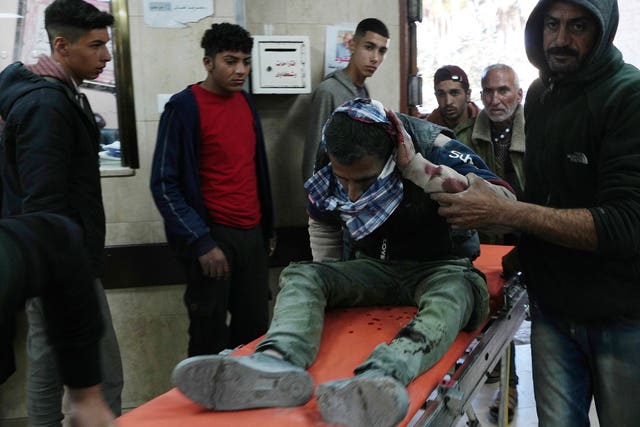Israeli strikes across Gaza overnight into Sunday killed at least 18 people, according to medics and witnesses, as the United States said it would veto another draft UN ceasefire resolution.
The US, Israel’s top ally, instead hopes to broker a ceasefire agreement and hostage release between Israel and Hamas, and envisions a wider resolution of the Israeli-Palestinian conflict.
Israeli Prime Minister Benjamin Netanyahu has pushed back, calling Hamas’s demands “delusional” and rejecting US and international calls for a pathway to Palestinian statehood.
His cabinet adopted a declaration on Sunday saying Israel “categorically rejects international edicts on a permanent arrangement with the Palestinians”, and opposes any unilateral recognition of a Palestinian state, which it said would “grant a major prize to terror” after the October 7 attack that triggered the war.
Mr Netanyahu has vowed to continue the offensive until “total victory” over Hamas and to expand it to Gaza’s southern-most town of Rafah, where more than half the enclave’s population of 2.3 million Palestinians have sought refuge from fighting elsewhere.
An air strike in Rafah overnight killed six people, including a woman and three children, and another strike killed five men in the southern city of Khan Younis, the main target of the offensive over the past two months. Associated Press journalists saw the bodies arrive at a hospital in Rafah.
In Gaza City, which was largely evacuated and suffered widespread destruction in the initial weeks of the war, an air strike flattened a family home, killing seven people including three women, according to Sayed al-Afifi, a relative of the deceased.
The Israeli military rarely comments on individual strikes and blames civilian casualties on Hamas because the militants operate in dense residential areas.
Meanwhile, the head of the World Health Organisation (WHO) said Nasser Hospital, the main medical centre serving southern Gaza, is no longer able to function after Israel raided the facility late last week.

In a post on X, Dr Tedros Adhanom Ghebreyesus said a WHO team was not allowed to enter the hospital on Friday or Saturday “to assess the conditions of the patients and critical medical needs, despite reaching the hospital compound to deliver fuel alongside partners”.
He said there are still about 200 patients in the hospital, including 20 who need urgent referrals to other health facilities.
Israel says it has arrested more than 100 suspected militants, including 20 who it says participated in Hamas’s October 7 attack, without providing evidence. The military says it is looking for the remains of hostages inside the facility and does not target doctors or patients.
The war erupted after Hamas burst through Israel’s defences and attacked communities across southern Israel on October 7, killing some 1,200 people, mostly civilians, and taking around 250 hostage.
Militants still hold around 130 hostages, a fourth of whom are believed to be dead, after most of the others were released during a week-long ceasefire in November.
The war has killed almost 29,000 Palestinians, mostly women and children, according to Gaza’s Health Ministry, which does not distinguish between civilians and combatants in its records. Around 80% of Gaza’s population have been driven from their homes and a quarter face starvation.
David Satterfield, the US Middle East envoy for humanitarian issues, said on Friday that Israeli strikes on Hamas-run police guarding aid convoys had caused them to halt the escorts, making it “virtually impossible” to deliver desperately-needed aid because of the threat of criminal gangs. He also said Israel has not presented specific evidence for its claims that Hamas is diverting UN aid.
At the UN, Algeria, the Arab representative on the Security Council, has circulated a draft resolution demanding an immediate humanitarian ceasefire and unhindered humanitarian access, as well as rejecting the forced displacement of Palestinian civilians.
US Ambassador Linda Thomas-Greenfield said in a statement late on Saturday that the draft resolution runs counter to Washington’s own efforts to end the fighting and “will not be adopted”.
She added: “It is critical that other parties give this process the best odds of succeeding, rather than push measures that put it – and the opportunity for an enduring resolution of hostilities – in jeopardy.”




Why are you making commenting on The National only available to subscribers?
We know there are thousands of National readers who want to debate, argue and go back and forth in the comments section of our stories. We’ve got the most informed readers in Scotland, asking each other the big questions about the future of our country.
Unfortunately, though, these important debates are being spoiled by a vocal minority of trolls who aren’t really interested in the issues, try to derail the conversations, register under fake names, and post vile abuse.
So that’s why we’ve decided to make the ability to comment only available to our paying subscribers. That way, all the trolls who post abuse on our website will have to pay if they want to join the debate – and risk a permanent ban from the account that they subscribe with.
The conversation will go back to what it should be about – people who care passionately about the issues, but disagree constructively on what we should do about them. Let’s get that debate started!
Callum Baird, Editor of The National
Comments: Our rules
We want our comments to be a lively and valuable part of our community - a place where readers can debate and engage with the most important local issues. The ability to comment on our stories is a privilege, not a right, however, and that privilege may be withdrawn if it is abused or misused.
Please report any comments that break our rules.
Read the rules hereLast Updated:
Report this comment Cancel